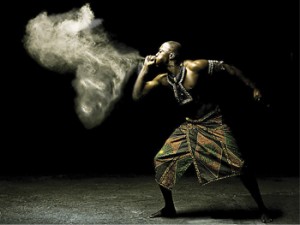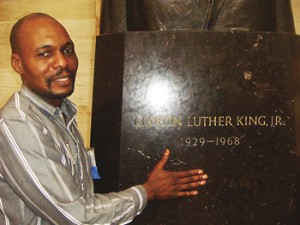INVISIBLE AFRICA…A refugee’s story
November 2, 2012 by Las Vegas Black Image Magazine
Filed under Feature
BY KIMBERLY BAILEY-TUREAUD
We are often reminded of the consequences of violence in the Middle East, but relatively little attention is paid to the ongoing state of deadly conflict that plagues the continent of Africa.
In few places has the bloodshed been more concentrated than in the Democratic Republic of the Congo — where violence and malnutrition claimed an estimated 5.4 million lives from 1998-2007, in what many called “The World War of Africa.” Compounding the tragedy, a 2011 study found that 48 women are raped every hour in the Central African nation.
Las Vegas resident Luzau Balowa is a refugee from the DRC, where he was a journalist and teacher. In 2002, he received a six-month jail sentence for his writings against government injustice and sexual violence. He eventually managed to escape his homeland and, via Kenya, resettled in Las Vegas with his wife and son in 2008.
Granted asylum, the Balowa family was selected by the federal Office of Refugee Resettlement to receive the assistance they need to achieve self-sufficiency in the United States.
“The purpose of the federal Refugee Resettlement Program is to give refugees a second chance on life, and afford the refugees an opportunity to live in a country where they will be safe from war and trouble,” said Balowa. “You can apply for your green card after one year, and United States citizenship after five years. I am a lawful alien.”
Nevada welcomes more refugees — about 400 per year — than any other state in the U.S. and, upon their arrival, nonprofit organizations like Catholic Charities and others provide them with financial resources, housing and medical assistance.
Today, Balowa tutors UNLV students in French, and serves as chairman of the African Rights Activist Group, an organization he founded. Its stated mission: to “Educate, inform, protect and provide services to refugees and immigrants in the state of Nevada and across the United States. Facilitating refugees’ integration within the American society — regardless of race, creed, religion, color, sex, marital status, sexual orientation or physical challenges — is the objective of the organization.”

“The Congo is a wealthy nation with gold, diamonds and minerals that assist in technological advancements in America.
“It is hard to estimate how many refugees our organization has assisted, because we help refugees who come from all over the world — not just from Africa,” said Balowa. “We provide services to refugees from Vietnam, Cuba and Bhutan, just to name a few. When we talk about refugees, we talk about those from all over the world — not just from one continent.”
In August, Balowa was among 49 people selected to participate in the United Nations Refugee Agency’s Refugee Congress, where a proclamation was issued to provide a framework for refugees to lobby more effectively to have their struggles recognized in the U.S. and across the world.
“We need the United States Congress … and president to join our fight against the injustices in the Congo,” said Balowa. “The Congo is a wealthy nation with gold, diamonds and minerals that assist in technological advancements in America. The corruption and violence is killing the people, and we must help my country make a change. Democracy is wanted everywhere, and Africa has been there for America, and now America needs to be there for Africa. One day I will go home to a peaceful nation, where I feel better — because the Congo is in my blood.”
For more information, go to:
www.aragrci.com.






